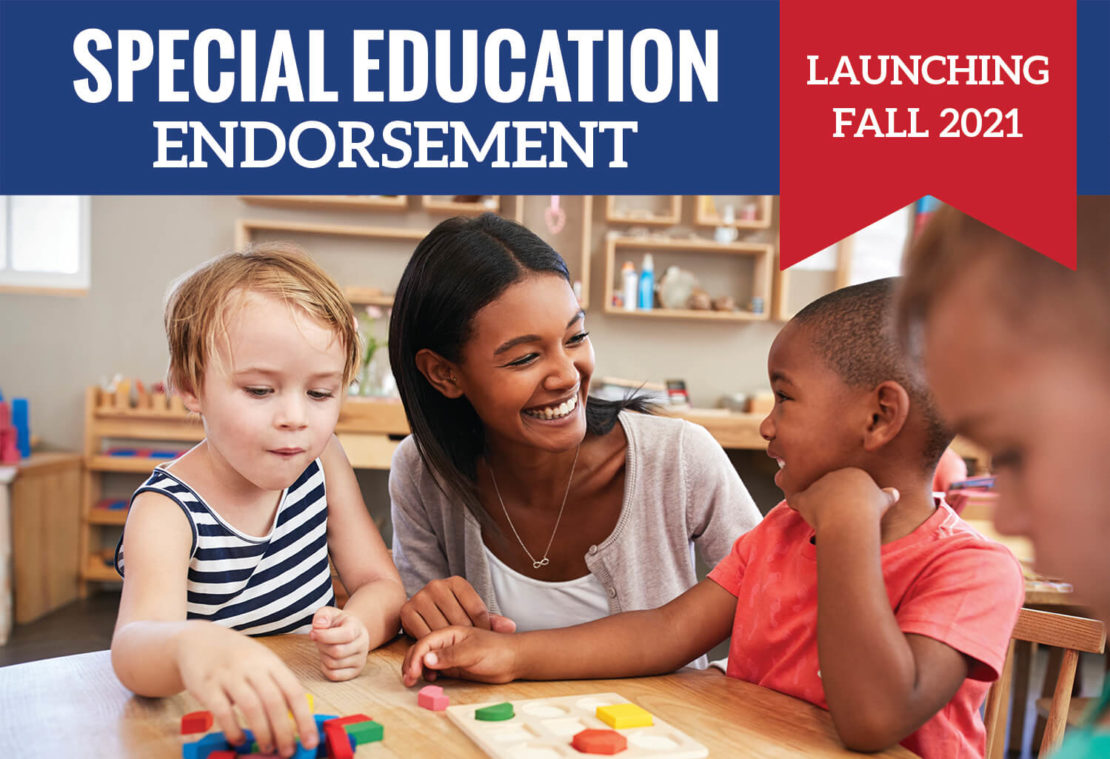
Live out your calling to teach and serve those who find themselves in need of an exceptional educational experience. Whether you are a current student, a practicing elementary teacher, or exploring paths to initial licensure, the Special Education Interventionist (K-8) endorsement is designed to meet you where you are.
Candidates for the endorsement will be prepared to assess students and develop Individualized Education Plans, design accommodations and modifications for learning, and build a collection of successful teaching and learning strategies for student success.
Dual and Add-On Endorsements Available
Students pursuing B.S. Degree in Elementary Education Grades K-5 with a K-8 Special Education Interventionist minor will take the special education courses along with other coursework. A Special Education Interventionist K-8 endorsement may serve as an additional endorsement for a licensed K-5, K-6, or K-8 teacher through the post-baccalaureate program.
Accredited & Achievable
- 34-hour program completed in as little as 12-months
- Courses completed online with the exception of SPED 3200 and SPED 4490 (student teaching)
- Program addresses each of the Council for Exceptional Children’s Initial Level Preparation Standards along with their key elements in learning disabilities and in emotional and behavioral disorders and the InTASC Standards for teacher preparation.
- King University is accredited by the Southern Association of Colleges and Schools Commission on Colleges (SACSCOC)
Affordable
- Free Application for Federal Student Aid (FAFSA) – fafsa.ed.gov
- Affordable Payment Plan
- Semester costs may be divided into monthly payments without interest charges
- Employer Tuition Reimbursement (if applicable)
- No up-front payments required for amount reimbursed by employer

Requirements
- Undergraduate candidates seeking dual licensure in Elementary (K-5) and Special Education (K-8) will complete the Special Education minor in addition to the IDST Elementary Education major coursework beginning after successful completion of SPED 2100 – Survey of Exceptional Children. Student teaching (SPED 4490) will include a special education placement and an elementary placement. Graduate candidates seeking dual licensure will complete the Special
Education endorsement coursework in addition to the M.Ed. major and content coursework requirements. - Candidates who are current practicing teachers may add the Special Education Interventionist (K-8) endorsement to their active Elementary (K-5, K-6, or K-8) teaching license through the
post-baccalaureate program. After completing all SPED coursework, students must pass the Praxis II exam (5543 – Special Education: Core Knowledge and Mild to Moderate Applications) before they complete SPED 4700 – Practicum in Special Education. - Apply online to begin the Fall or Spring semester. Please apply online at king.edu/apply
Technology Requirements:
- Students in the program are required to supply their own laptop computer (PC or Mac), with fully functional Microsoft Office 2016 or newer, Excel, wireless capability, and webcam. Microsoft Office 365 is available to all King students to load on the PC or Mac and is accessible at Office.com using their King University credentials. Tablets or other devices without fully functional Microsoft Office 2016 or newer do not satisfy this requirement.
Advantages
- Teachers who desire to work in inclusive special education environments will be prepared to serve both low and high incidence students’ individual and unique needs and be a liaison for all stakeholders.
- Graduates with the special education endorsement will be prepared for the diverse students that make up both general education and special education classrooms. The general education classroom will serve 95% of those students who have a certifying disability. Data confirms that 66% of students with Other Health Impairments, 40% of students with Autism, 65% of students with developmental delays and 71% of students with learning disabilities are all served in a typical classroom environment with accommodations and modifications (U.S. Department of Education, Office of Special Education and Rehabilitative Services, Office of Special Education Programs, 40th Annual Report to Congress on the Implementation of the Individuals with Disabilities Education Act, 2018, Washington, D.C. 2018).
- Candidates for the endorsement will learn to assess students and write individualized education plans, design accommodations/modifications for learning, create early transition plans, understand how to write effective learning goals, and build a repertoire of successful teaching and learning strategies for student success.
Special Education Endorsement Courses
This course introduces characteristics of exceptional children and their education. Includes study of historical and legislative background, mental and physical disabilities, and instructional strategies. Emphasis on educational, social, cultural, and psychological needs of exceptional children. Students are expected to observe in public school classrooms as a part of this course.
- 4 sh
The nature and characteristics of persons with mild exceptionalities will be emphasized along with appropriate educational strategies. Exceptionalities such as reading and written expression disabilities, math disabilities, auditory processing, dyslexia, Attention Deficit Hyperactivity Disorder and Asperger’s Syndrome will be emphasized. Identification of appropriate interventions will be integral to learning about the characteristics and psychology of these and other mild exceptionalities.
- 3 sh
- Prerequisite: SPED 2100
Assessment, curriculum planning, and instructional approaches used to understand and support exceptional persons through the implementation and design of Individual Education Plans (IEP) are emphasized in this course. Inclusion in the least restrictive environment is a point of major emphasis. Learners will use and experience diagnostic tests that guide descriptions of learners, placement, and recommendations for service in the least restrictive special education range of services. Clear statements of appropriate learning goals and objectives, as well as meeting legal requirements, will be included in the development of an IEP.
- 3 sh
- Prerequisite: SPED 2100, SPED 3100
Implementing best practices for persons with exceptionalities, including intervention and accommodation, are the focus of this course. Appropriate psychological and educational considerations for intervention in high incidence exceptionalities will be identified with emphasis on monitoring and adjusting for appropriateness and effectiveness. Students will learn strategies and technological supports for modifying instruction and collaborating with regular classroom teachers to facilitate the success of these persons within the general education classroom. Response to
intervention strategies will be incorporated.
- 3 sh
- Prerequisite: SPED 2100, SPED 3100
This course will emphasize the nature and unique characteristics of persons with low incidence exceptionalities along with educational strategies appropriate for intervention. Learners will develop an understanding of the learning and behavioral characteristics of persons with severe and multiple exceptionalities including intellectual disabilities, autism, health impairments and sensory loss. Adaptations and teaching strategies for meeting the needs of persons so identified will be
highlighted.
- 3 sh
- Prerequisite: SPED 2100, SPED 3100, SPED 3200
Characteristics of social-emotional deficits and analysis of causal effects of behavioral disorders is incorporated into application of strategies and interventions designed for general and special education classrooms. This course emphasizes design and application of strategies based upon development
and analysis of behavior support plans, functional behavior assessments and behavior intervention plans. The learner will study the design and implementation of appropriate learning modifications based on this information and the subsequent evaluation and modification of the interventions. Learners will examine practices such as direct instruction, positive behavioral supports, and assistive technology as they contribute to the least restrictive environment. Impact on family and community will be incorporated and communicating appropriately with parents and students will be emphasized.
- 3 sh
- Prerequisite: SPED 2100, SPED 3100, SPED 3200
This course provides the learner with a framework for professional special educators to intervene and consult with general education personnel and other professionals in addressing the needs of persons with exceptionalities. Students will examine the roles of other specialized professionals such as speech and language therapists, physical and occupational therapists, behavior specialists and psychologists and diagnosticians as well as the effective use and supervision of instructional assistants. Transitions from preschool to kindergarten, elementary to middle schools, middle to high school and high school to independent living will be studied. Community-based programs and family supports will be incorporated.
- 3 sh
- Prerequisite: SPED 2100, SPED 3100, SPED 3200, SPED 3300
- 2 sh
*For Add-on Endorsement – One face-to-face course, all other courses online.
This course includes discussions of issues related to student teaching and induction into the profession. One-half of the placement will be in a general education elementary setting, the other half will be in a special education setting. Students are required to present their final electronic portfolios and to pass state-mandated PRAXIS II tests to successfully complete this course.
- 10 sh
- Prerequisite: All courses in the academic major, all professional-level Teacher Education courses, overall GPA of 3.0, and successful completion of all licensure
assessments required by the Tennessee Board of Education - Corequisite: EDUC 4950